Here Are Some Fun Ways to Celebrate the Hungry Ghost Festival This Year
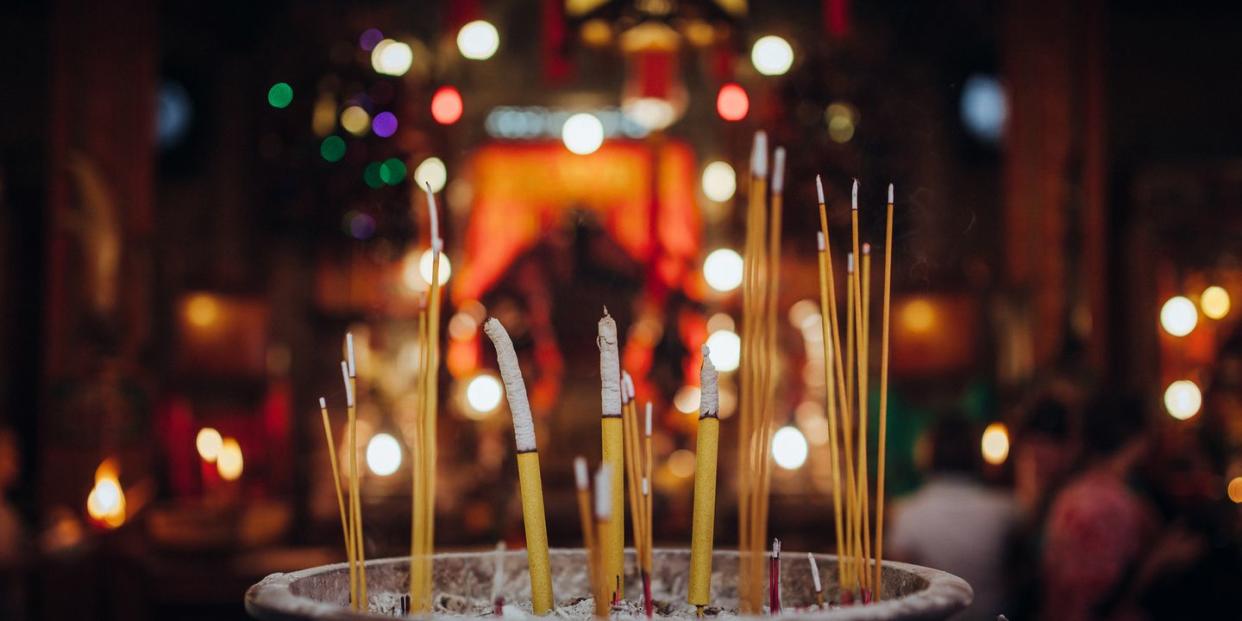
"Hearst Magazines and Yahoo may earn commission or revenue on some items through the links below."
It may be known as the "Chinese Halloween," but the annual Hungry Ghost Festival — also called the Zhongyuan Festival by Taoists and Yulanpen Festival by Buddhists — is more than just a celebration of all things spooky. During the month of the festival, ghosts are believed to break free from the afterlife and walk among the living, and Hungry Ghost Festival celebrations include everything from planning a ghost-feeding ceremony to folding joss paper ingots. And while the festival includes some similarities with the Western traditions of Halloween, it has more in common with Día de los Muertos, or Day of the Dead.
Held during the 15th night of the seventh lunar month of the year in the Chinese calendar, the Hungry Ghost Festival is a Buddhist and Taoist celebration used to pay tribute to the departed. To ease the suffering of the dead (and to make sure that hungry spirits don't make any trouble), celebrants offer up ritualistic foods, money, and entertainment all month long. Whether you're looking for ways to celebrate the Hungry Ghost Festival with your own family or just hoping to understand more about the annual celebration, here's everything you should know about the Hungry Ghost Festivities.
What is the Hungry Ghost Festival or Zhongyuan?
Many people are curious about what happens after they die, and while the unknown can seem scary, you may find that observing and understanding death can teach you how to live your own life to the fullest. That's what Ghost Month and the Hungry Ghost Festival is all about — among other things, of course. As Dr. Jiang Wu, an East Asian Studies professor at the University of Arizona, tells Woman's Day, "The Ghost Festival popular in Asian traditions is a unique way of answering our questions about death through reconnecting with the dead and their past."
During this time (which kicks off in mid-July or August), Chinese communities perform rituals oriented to their ancestors. "These rituals and ceremonies are often facilitated by Buddhist monks or Daoist priests to release the 'ghosts' of their ancestors from the suffering in hells and feed them with the symbolic food of compassion," Dr. Wu explains. And it's not just celebrated in China, either — the Hungry Ghost Festival is also commonly observed in Singapore, Malaysia, Taiwan, Hong Kong, Indonesia, Japan, and Vietnam, among other places.
Since the holiday is all about filial piety (which is service and respect to one's parents, elders, and ancestors), there are several traditional practices associated with the day, as well as taboos. According to intercultural language consultant and Miss Panda Chinese founder Amanda Hsiung-Blodgett, the three most common taboos during Ghost Month include swimming in rivers, holding weddings, and moving or buying a new home. And though some take these practices seriously, Hsiung-Blodgett adds that "the young generation in Chinese society no longer takes it seriously."
When is the Hungry Ghost Festival?
According to the Chinese lunar calendar, the entire seventh month of the year is known as Ghost Month, but the Hungry Ghost Festival is always celebrated on the 15th night of the month, which is also known as Ghost Day. This year, the first day of the seventh lunar month begins on July 29, 2022, which means that, in 2022, the Hungry Ghost Festival will take place on August 12.
How to celebrate the Hungry Ghost Festival
Since the Hungry Ghost Festival is celebrated in so many different places, the celebrations and ceremonies vary from region to region. However, you can expect a few common practices no matter where you go. As Dr. Wu says, "During the day, the tablets of the diseased ancestors and relatives must be displayed, and rituals of venerations be performed." Likewise, popular ritual operas — such as the Buddhist legend of Mulian releasing his mother from hell — are often put on stage.
Once night falls, paper money (commonly known as joss paper) or other paper offerings are often burnt, supposedly to be received by the dead. "Paper lanterns will also be released in rivers and lakes during the night to guide the spirit of their ancestors to return to home," Dr. Wu explains. "However, the general atmosphere today is not spooky or horrifying. Rather, it has gradually evolved into a celebration of family continuity and community solidarity."
Hsiung-Blodgett agrees, adding, "In Chinese culture, Ghost Month or Hungry Ghost Festival is a cultural event. It is more of paying respect to the deceased family members and the deceased with no families. This festival is more about respect instead of a celebration as many think outside of the Chinese community." And if you're looking to show respect during the Hungry Ghost Festival with your own family, then here are a few ways you can do it:
Fold joss paper ingots
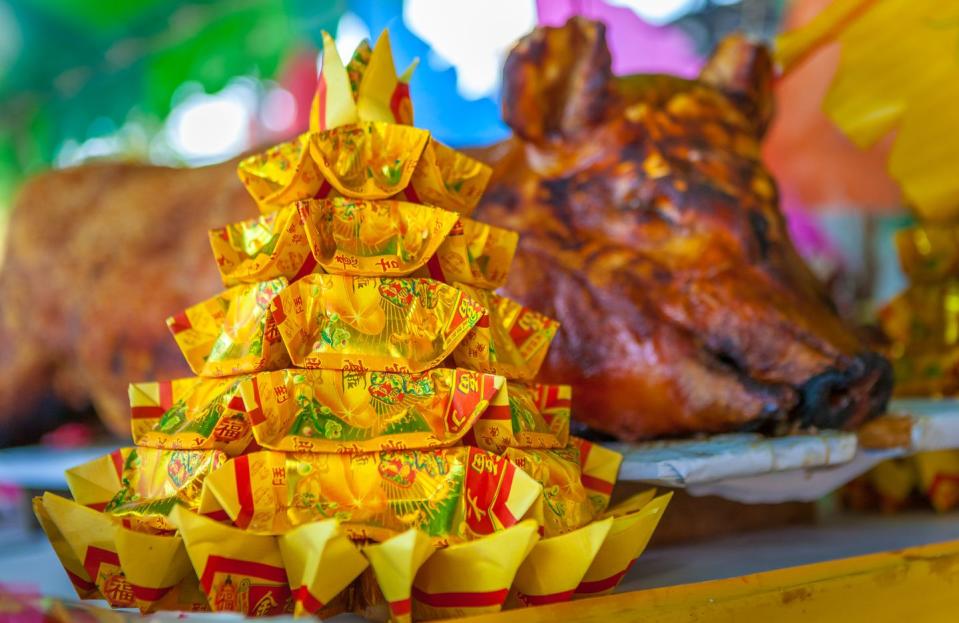
As well as burning paper money, it’s common practice to fold joss paper sheets into the shape of gold ingots, which were used in ancient China. It's a fun and mess-free craft you can do with your whole family, and once you buy some joss paper sheets, you can check out a joss paper ingot folding tutorial to get started.
Make floating lanterns

Since it's tradition to float a paper lantern down a river in order to lead spirits home during the Hungry Ghost Festival, why not try making your own? All you need is some string, coated paper plates, and tissue paper, as well as a floating lotus flower paper lantern tutorial to show you how it's done.
Create butterfly puppets
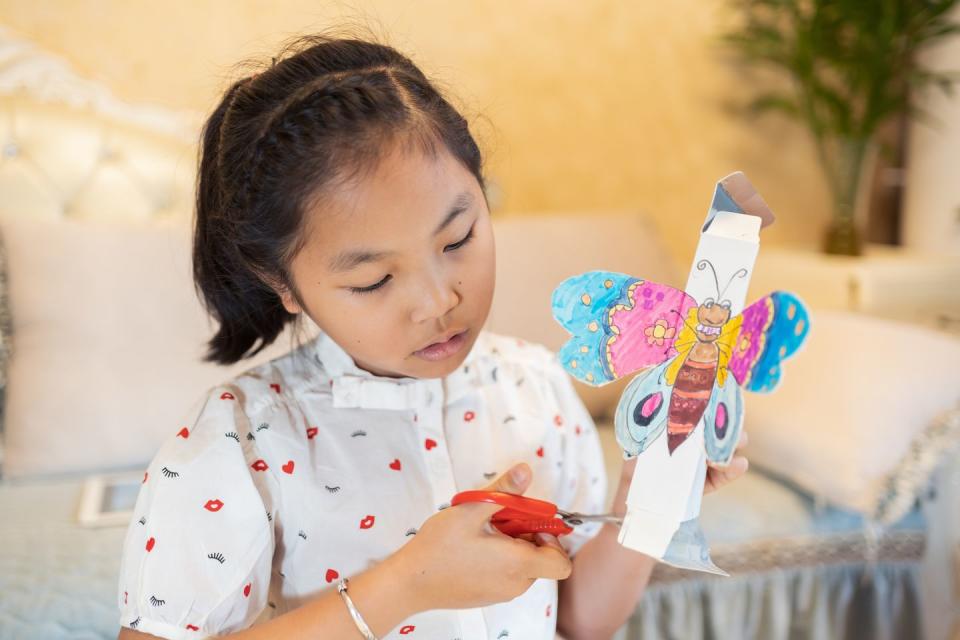
It's often said that insects such as butterflies, moths, and grasshoppers are the spirits of ancestors returning for a visit. You can pay tribute to these gentle creatures by having your kids craft up some easy butterfly puppets using craft paper and Popsicle sticks.
Make hanging orange decorations
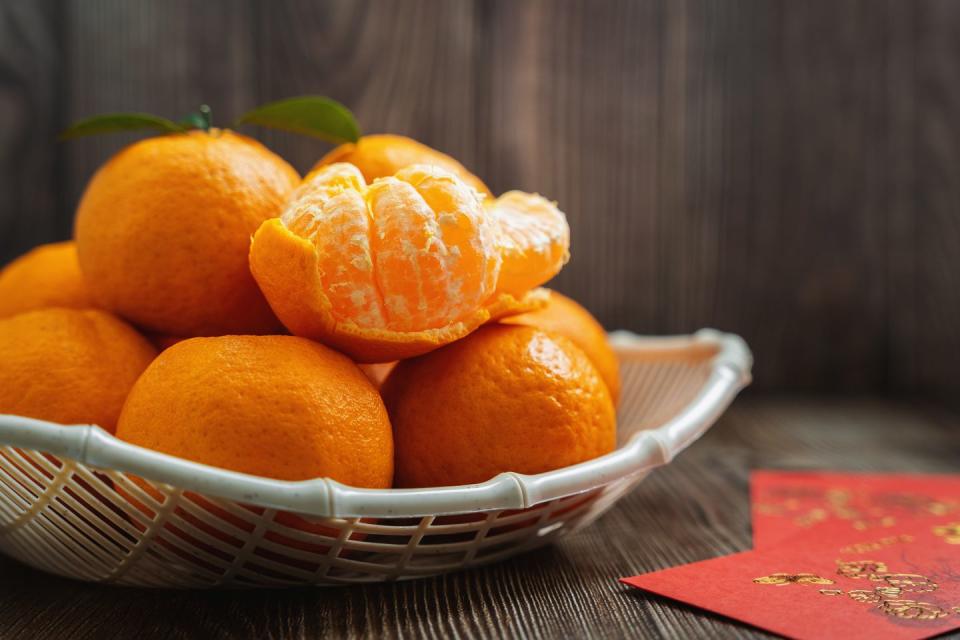
Oranges are an important fruit in Chinese culture, as they symbolize good luck and wealth and are often used as part of the offerings during the Hungry Ghost Festival. You can spruce up your own home by creating hanging citrus fruit decorations from paper and yarn with your kids.
Cook up some sticky rice dumplings
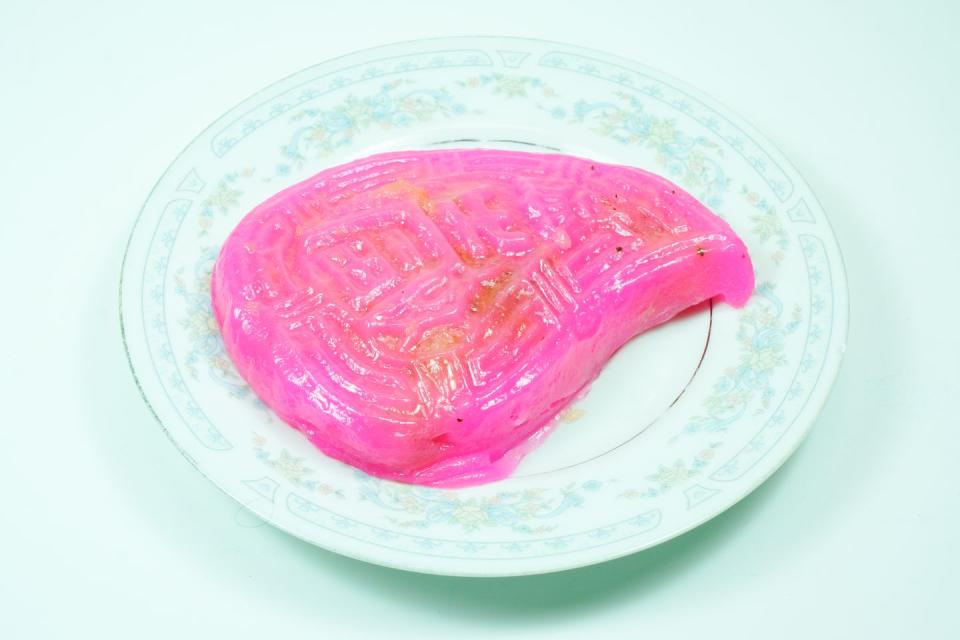
A popular delicacy known as png kueh (or peng kway) is associated with the Ghost Festival. Teochew png kueh is a dumpling filled with stir-fried rice, peanuts, garlic, and shallots, among other ingredients). These are dyed pink as a symbol of luck and left as offerings for the ancestors, and if you're up for the challenge, then you can make your own png kueh.
Attend community celebrations and performances
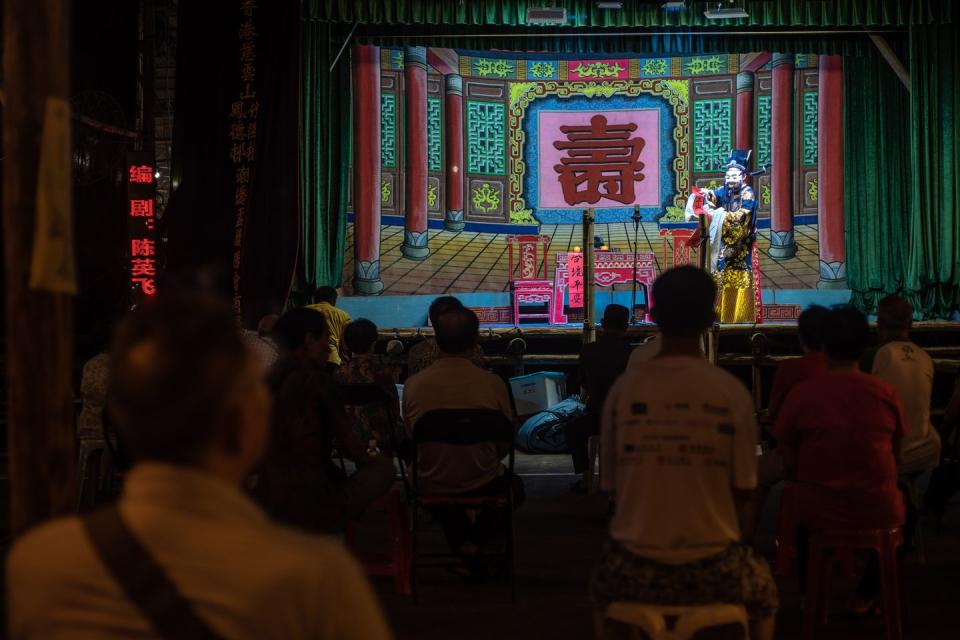
The Hungry Ghost Festival is celebrated throughout the month by various Chinese neighborhoods, and if you live near a large Chinese community, then you can attend your own opera performance or other celebration. If you go to a performance, make sure you leave the front row empty, as that row is traditionally reserved for ghosts!
Enjoy a family dinner
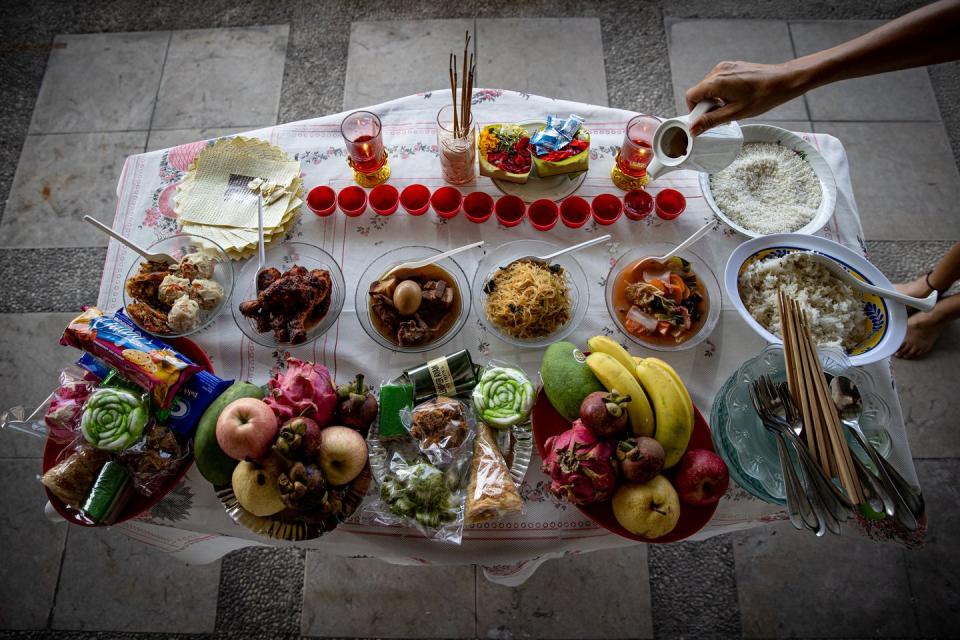
Like many traditional Chinese holidays, the Hungry Ghost Festival includes a family dinner. However, unlike other holidays, the focus is less on the symbolism of the food and more about feeding ancestors. Simply enjoying a family meal is a great way to pay tribute to the day (and make sure you set an extra place or two at the table for the departed).
Perform an appeasement ceremony
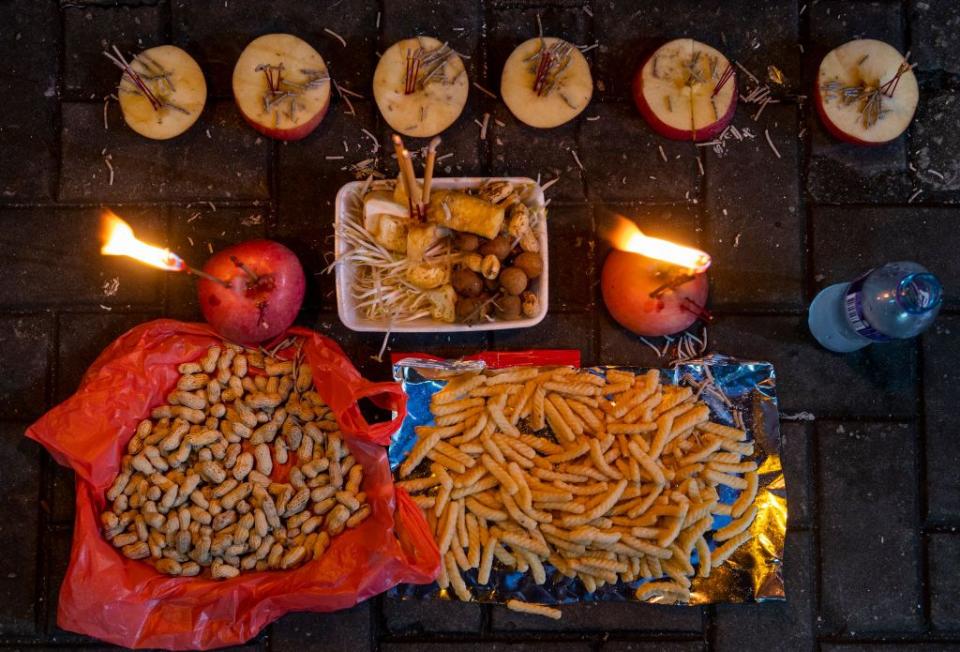
At night, it's tradition to set up a makeshift altar outside in order to display offerings for passing spirits. In addition to joss paper, joss sticks, and incense, you can offer up foods like uncooked rice, peanuts, candies, raw noodles, fruit, and even bags of salt and sugar for passing ghosts. Small cups of tea and rice wine are also appreciated.
You Might Also Like

